By Sara L. Jewell
Another excellent addition to NYCC's robust slate of virtual programming this year was Thursday's "Smash the Binary!" panel with a lineup of creators invested in challenging or complicating the limitations of binary conceptions of gender and sexuality in their work. Panelists Melanie Gillman (As the Crow Flies), Bishakh Som (Spellbound), Maia Kobabe (Gender Queer: A Memoir), and L. Nichols (Flocks) joined moderator Liz Francis of Streetwise Books to discuss their creative journeys and processes in breaking down normative barriers in comics.
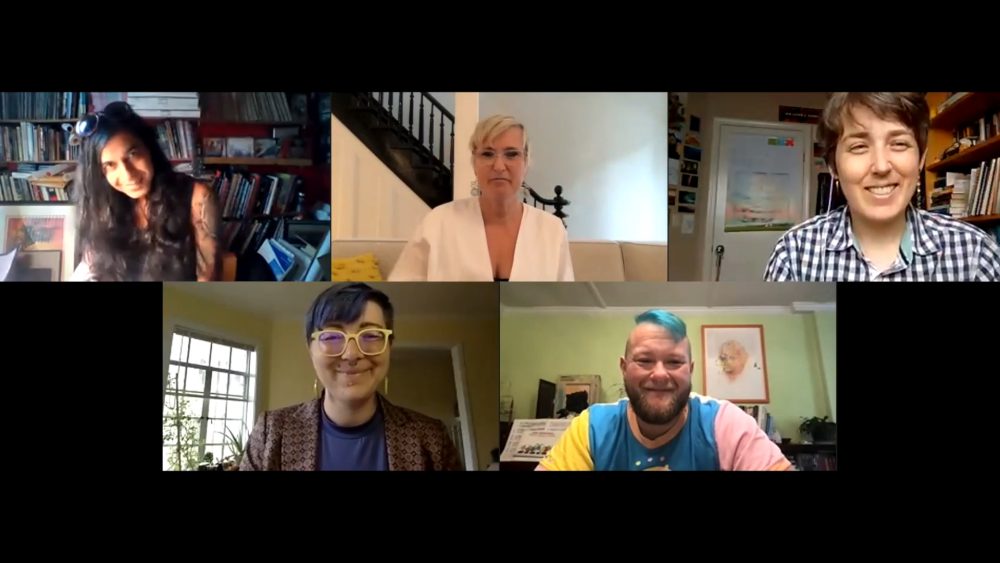
Francis opened the panel with a question about whether the medium itself is one uniquely suited to engaging with gender barriers. Kobabe was quick to jump in and bring up the way in which comics offer trans, queer, and gender nonconforming creators the ability to portray themselves exactly as they see themselves. Nichols, who draws himself frequently as a stylized ragdoll figure, echoed this sentiment. "I just couldn't conceive of a way to portray an embodiment of myself on the page…to [then] have something that could be so abstract, but also relatable…was a really great way to see myself in a way that I couldn't otherwise." Som, whose graphic memoir Spellbound closely cleaves to questions surrounding self-representation, also found Kobabe's point resonant. In her process for Spellbound Som created a character who is a cis woman that acted as a substitute for herself, both predating and becoming a factor in her realization that she was trans. "It felt natural to me to represent myself as this other character who happened to be a woman," she said, "at a time when I was still in a fog about who I was."
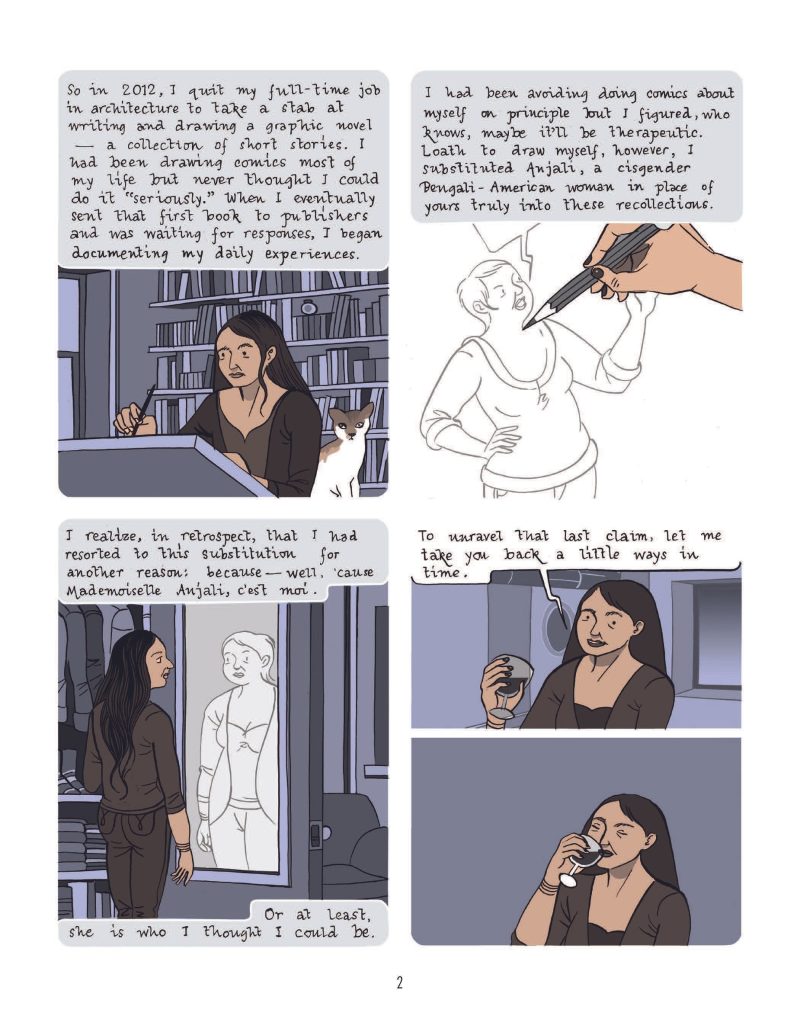
From Spellbound
Gillman nodded. "That's been a really important part of my practice as a cartoonist," they said, "thinking about visual representation…built within the comics medium itself is a really rich, beautiful minable thread of queerness that goes through the entire medium on a structural level, too." They expounded on the potential for both power and freedom inherent in the blank page for cartoonists which is especially powerful for queer and trans creators. Gillman also brought up how comics itself is often a subversive medium that allows for techniques which challenge the reader, like building tension with the difference between what the text says and the images portray.
Kobabe then mentioned a recent Vox article about writer Isabella Fall that had really stuck with em, about how trans creators can only often come to understand their own trans identity through the process of writing about being trans. "There's something about process of making it [our work] that is also a process of becoming," e said. "There's something about that which also feels rather queer, that process of like, giving birth to yourself, almost."
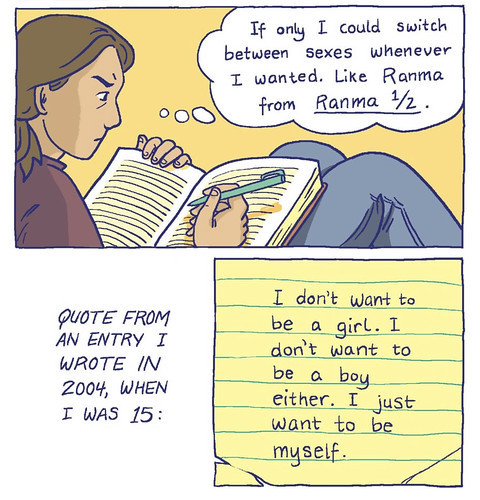
From Gender Queer: A Memoir
Gillman spoke about the poignance of a single-creator comic's innate individuality within a queer context. "It's this unique visual language that is as unique to each individual as their own handwriting…there's a way in which the identity of the author is always leaving its own fingerprints on the page in comics, whether or not we are directly talking about our own personal experiences…" Francis chimed in that this is a big differentiation between comics and prose: in prose, the reader is projecting their own image based on the writing, in comics, there's visual specificity and a departure in the level of personalization.
Of the possibilities of the form's potential disjuncture between words and image, Som said this was one of the things that she loved most about comics. Nichols brought up the way he employs things like equations and symbols in his work, and how he appreciates the way comics can simultaneously convey multiple "channels" of information. He also praised the "consistency of self" offered by comics in his avatar, which remains recognizable despite how Nichols himself might change over time. Gillman brought up how comics appeals to them in the same way that the word "queer" does as expansive terminology, which Gillman finds especially useful in trying to convey the amorphism of gendered experiences.
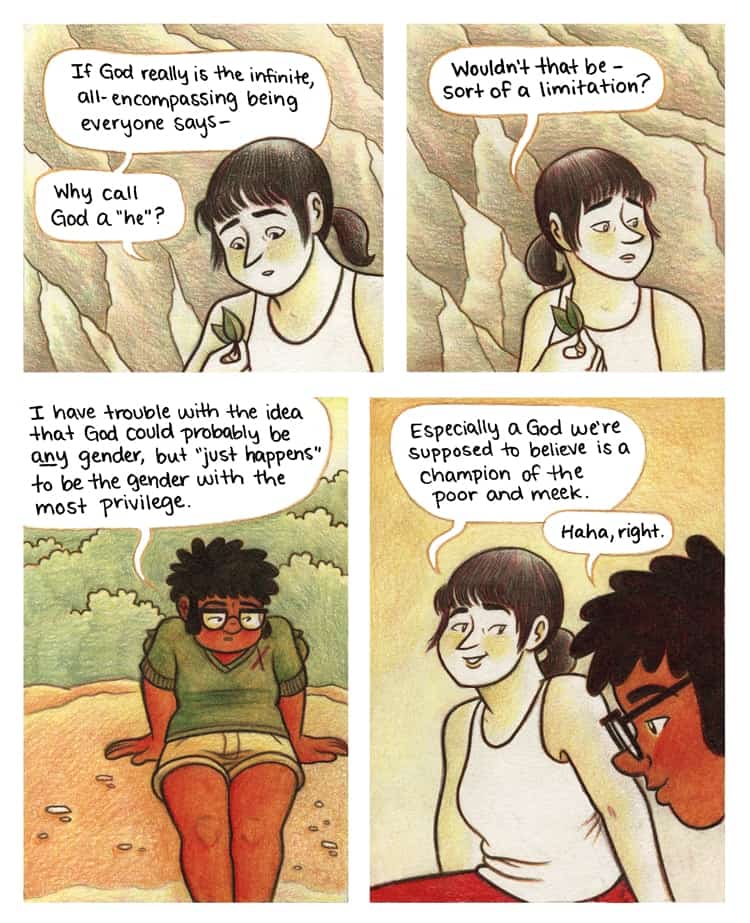
From As The Crow Flies
Kobabe pushed back on this idea a little bit, remarking that in the early days of understanding emself as nonbinary, e was looking for more concrete ways and terminology to think about what that meant. "I remember asking myself as a 23 year old 'what does a nonbinary adult look like?" Kobabe then told an anecdote about picking up a zine of Gillman's entitled Nonbinary in 2014 at ECCC and having heard recently from another nonbinary cartoonist that it was also their first encounter with that identity being discussed in comics – e wryly also describes thinking that the time that e would "never publish anything like this," before going on to publish Gender Queer.
Gillman reflected on the impact the comic is still having, which surprises them since it was made very early on in their own period of understanding themselves and was a comic they had initially made as a personal explanation for people like their mother. Gillman compared it to the mainstream embrace of Kobabe's Gender Queer and asked Kobabe about what it's been like having the book enter into spaces that aren't always queer, even being incorporated into college syllabi. Kobabe reflected on the limitations of an autobiographical comic as a kind of frozen moment, bringing up that their sibling came out as nonbinary not long after the book's publication and now uses pronouns different from the ones by which they are referred to in Gender Queer. E asked how the other panelists negotiate how they may have changed since capturing their lives in the memoir comics.
Nichols described not being able to read Flocks for a while after he finished it. As a father to two young children, he is now working on a project about being a trans parent and navigating spaces that are sometimes intensely gendered. He talked about coming up against the feeling that he is okay with being called a dad, but not necessarily comfortable with being called a man. "Why am I okay with this sort of gendered term, but not this other one?" He wondered, saying he concluded that being a dad is a relationship that has meaning to two other people and is negotiated and understood on a personal level, whilst the other carries many uncontrollable societal implications and assumptions. Som responded to Kobabe's question by remarking on the "defensive" distance she had initially striven to create between herself and the protagonist in Spellbound before she came out. She said even though a fair amount of time has passed, she sees the story as a kind of "refracted" version of her own story, situating her coming out within the interplay and identification between the book's multiple characters.
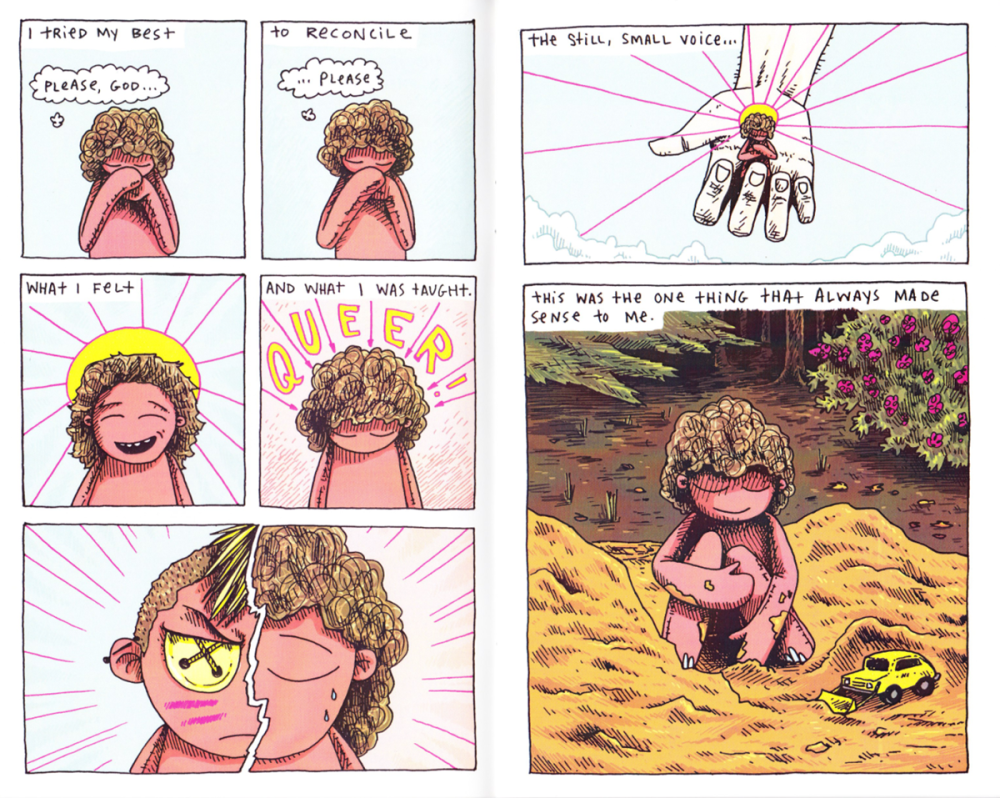
From Flocks
Francis then shifted to the topic of writing queer and trans characters into genre fiction. Gillman brought up how they really love genre fiction and were excited to work with it. They also disdained the bigoted fallacy in thinking queer and trans stories are "new" in the context of historical fiction. "Finding examples of queer and trans folks in past generations is one way to fly in the face of that…and say 'we've always been here, this isn't something new, this has been a part of our history for as long as humans have been a thing," they said.
Kobabe brought up how it can sometimes be difficult to apply modern labels to historical figures when we can't know for sure, but that it can be really valuable to still read the possibility of queerness in some shape or form. E talked about how this resonates with many readers, not necessarily just queer and trans readers, because "as it turns out, every single person has an individual relationship to their gender, whether or not they feel like they're cis or not cis….everyone is navigating the complicated ways that gender and society interact, and seeing a model of that in fiction…can open up new possibilities and new ways to apply gender to your own life, seen through the lens of a character," which can be valuable in every genre.
Finally, the panelists discussed the role of the comics community itself in their lives. Gillman remarked that the comics community has been "invaluable" to them, and is now replete with unique queer and trans voices. Kobabe felt much the same, and talked about having already been on panels previously with all of the panelists and feeling delighted to "talk to my friends" again for an hour. E described the indie comics community especially as particularly tight-knit and friendly. Som said she "absolutely dreaded going to cons, even though I felt like I kind of had to?" before she came out as trans. She described "mixed feelings" even now about past experiences with an often cisgender male-dominated comics culture, and having not had as much of an opportunity to engage with the queer comics community before things were thrown into turmoil in 2020.
Nichols, who has been going to shows for over a decade, remarked that the community has changed a lot in that time and is "very queer these days," but perhaps something that he "came to much later" after making work that wasn't explicitly centered around queerness, like Flocks. "Part of it was learning about myself? But also figuring out myself….when I first started transitioning 10, 11 years ago, it was way more binary back then." Nichols talked about really disliking assumptions that people would make the most. "I always joke that my gender is just 'no" he said. "but overall, the community is a big reason that I keep making comics."
Miss any of our other NYCC '21 coverage? Click here to check it out!






No comments:
Post a Comment